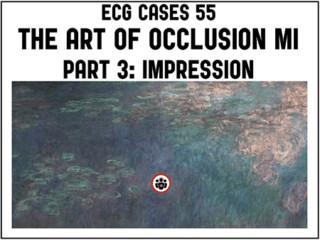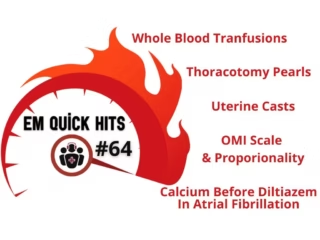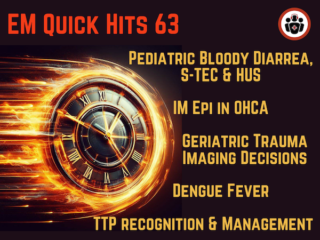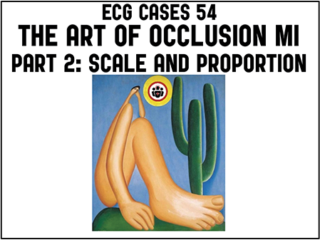Most Recent
ECG Cases 55 The Art of Occlusion MI Part 3 – Impression
In this ECG Cases blog Dr. Jesse McLaren guides us through 6 illustrative cases delving into overall impression in identifying occlusion MI. He discusses how using multiple OMI findings such as acute Q wave, subtle STE, reciprocal STD, hyperacute T waves, and reciprocal TWI to contribute to your overall impression, can double the sensitivity of STEMI criteria for acute coronary occlusion...
EM Quick Hits 64 Whole Blood Transfusions, Calcium Before Diltiazem in Afib, Thoracotomy Pearls, Uterine Casts, OMI Scale & Proportionality
In this month's EM Quick Hits podcast: Zafar Qasim & Andrew Petrosoniak on whole blood transfusion in trauma, Justin Morgenstern on calcium pre-treatment to prevent diltiazem-induced hypotension, Kiran Rikhraj on dynamic LV outflow tract obstruction, Anand Swaminathan on resuscitative thoracotomy, Andrew Tagg on uterine casts, and Jesse McLaren on scale & proportionality in occlusion MI ECG interpretation. **Please support EM Cases to continue to be free open access by making a donation: https://stg-emergencymedicinecases-emcstaging.kinsta.cloud/donation/
Ep 203 Intermediate Risk Pulmonary Embolism Risk Stratification, Management and Algorithm
How do you predict which intermediate-risk patients will suddenly deteriorate? What role do risk scores, biomarkers, imaging, and hemodynamics play in decision-making? Should these patients receive anticoagulation alone, or is thrombolysis warranted? When should you consider catheter-directed or surgical interventions? This podcast focuses us to think critically about risk stratification, early interventions and escalation in care in PE. We include an algorithm in the show notes. Not all patients fit neatly into classification boxes, making clinical judgment crucial. Join Dr. Lauren Westafer, Dr. Justin Morgenstern, Dr. Bourke Tillman and Anton as they explore the key decision points, pitfalls, and lifesaving strategies for managing intermediate-risk PE in the ED...
EM Quick Hits 63 S-TEC and HUS, IM Epinephrine in OHCA, Dengue, Geriatric Trauma Imaging, TTP
On this month's EM Quick Hits podcast: Stephen Freedman on pediatric bloody diarrhea, S-TEC and hemolytic uremic syndrome, Justin Morgenstern on the evidence for IM epinephrine in out of hospital cardiac arrest, Matthew McArther on recognition and ED management of dengue fever, Andrew Petrosoniak on imaging decision making in trauma in older patients, Brit Long & Michael Gotlieb on recognition and management of TTP...Please consider a donation to EM Cases to help ensure continued Free Open Access Medical Education here: https://stg-emergencymedicinecases-emcstaging.kinsta.cloud/donation/
Ep 202 Eating Disorders: Common, Commonly Missed, Mismanaged and Misunderstood
Eating disorders have the highest mortality rate of any psychiatric illness, yet they are frequently missed in the Emergency Department as they can be elusive. Only one in 246 patients who screen positive for an eating disorder at triage have a chief complaint suggesting it. These patients don’t always fit the stereotype—many appear “healthy,” have normal BMI, or present with vague GI, cardiac, or neurological symptoms. Missing the diagnosis has important consequences. The earlier an eating disorder is identified and the earlier that appropriate treatment is initiated the better the long term outcomes. In this episode, with the expertise of Dr. Samantha Martin and Dr. Jennifer Tomlin, we’ll break down the essential clinical clues, screening questions, red flags, and subtle exam findings that can help Emergency Physicians diagnose eating disorders early and initiate treatment to decrease mortality and long term morbidity in these young patients. Eating disorders need to be thought of as both a psychiatric condition and medical condition to optimize the pick up rate and appropriate management. Missing or mismanaging eating disorders in the ED means missing an opportunity to save a life and prevent long term morbidity... Please consider a donation to EM Cases to ensure continued Free Open Access Medical Education here: https://stg-emergencymedicinecases-emcstaging.kinsta.cloud/donation/
ECG Cases 54 The Art of Occlusion MI: Scale and Proportionality
On this month's ECG Cases, Dr. Jesse McLaren explains how STEMI criteria can be false positive with large scale QRS and proportional ST elevation, or false negative with low/normal scale QRS and disproportionate ST elevation and hyperacute T waves, and that rules for subtle occlusion using proportionality can help differentiate LBBB with or without Occlusion MI, or LV aneurysm vs anterior STEMI with Q waves... Please consider a donation to EM Cases to ensure continued Free Open Access Medical Education here: https://stg-emergencymedicinecases-emcstaging.kinsta.cloud/donation/







